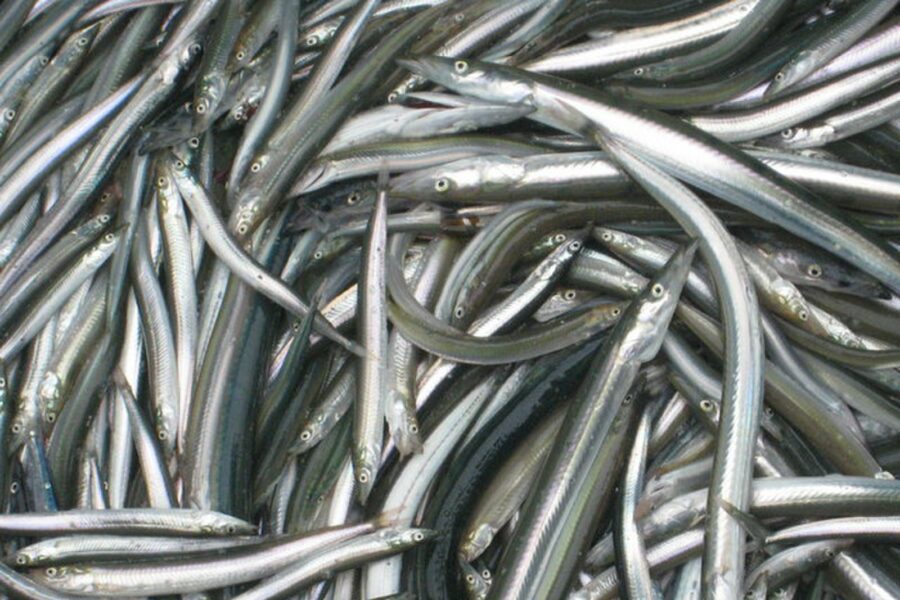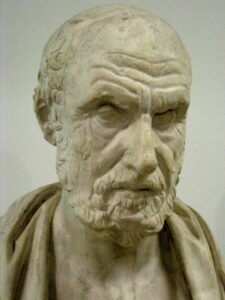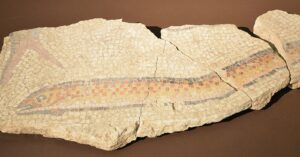
Do you see any eel gonads? Well, DO YOU?
Episode 36: In which Pliny the Elder, Aristotle, and Hippocrates are greatly perplexed by eels, as all humans should be.
This episode of Real Housewives of Hades (a Mt. Olympus spin-off) brought to you by the latest archaeological news on SmithsonianMagazine.com – and by CLAS-B 314 The Environment in the Ancient World.
[SETTING: Underworld Scientific Academy]
PLINY THE ELDER, ANCIENT SCIENTIFIC WRITER AND TERRIBLE VULCANOLOGIST: Good news, everyone! The mortals have finally made major progress on the greatest scientific question of our time!
HIPPOCRATES, ANCIENT PHYSICIAN AND FATHER OF MEDICINE: How to reconcile social health concerns with individual human autonomy? (glares at 2022 Supreme Court)
PLINY THE ELDER: No, much more important than that. The question above all questions: Do eels have gonads?
HIPPOCRATES: I’m sorry, what? Are you having a stroke?
PLINY THE ELDER: A stroke of genius, indeed! That eel question is the question! Where do baby eels come from? Some of the greatest minds of the ancient world pondered this problem.
ARISTOTLE, ANCIENT PHILOSOPHER AND SCIENCE NERD: I bet my theory ended up being correct. Eels lack reproductive organs entirely. They spontaneously emerge from the bowels of the earth.
HIPPOCRATES: Why in the world would that be your theory. No other animals reproduce like that. Why would eels be the exception to the sexual reproduction rule?

Someone’s upset about eels.
ARISTOTLE: My logic was flawless. I have genitals, and I reproduce sexually. I couldn’t find the eels’ genitals, therefore they must not have any. Ergo, eels do not reproduce sexually.
HIPPOCRATES: Why were you looking for eel genitals?
PLINY THE ELDER: Sorry, Aristotle Old Boy, no such luck. If it’s any consolation, my theory wasn’t correct either. I thought eels rubbed themselves on rocks, and the skin that fell off came to life as more eels.
HIPPOCRATES: Ew. What in the world gave you that idea? Don’t answer that question, I don’t want to know.

Art historians refuse to admit that when Pliny the Elder famously praised a sculpture of Laokoon and His Sons Devoured by Sea-Serpents, it was just more eel-fetish talk.
ARISTOTLE: Your theory was a bit daft, Pliny. You should have followed my lead and devoted more time to looking for the eel’s gentlemen and lady parts.
HIPPOCRATES: How would you even know what to look for when it came to eel genitals? You thought a woman’s uterus wandered around her body and made her cranky when it got bored. You’re hardly an authority on reproductive organs.
ARISTOTLE: I will know exactly as much about female anatomy or eel anatomy as I choose, thank you very much.
PLINY THE ELDER: It turns out that the answer is eels all swim thousands of miles to a magic sea-within-a-sea, past the Pillars of Hercules in what they are now calling the Atlantic Ocean. There thousands of eels congregate and mate, somehow, and then they give birth, somehow. Then the young change their forms so distinctly they might be different animals, and grow as they feed, on something, somehow, before magically making their way back across the ocean to their home in the Mediterranean, through means we cannot fathom.
HIPPOCRATES: I don’t believe that sounds like much of an improvement in human understanding, scientifically speaking.

A recent illustration from a $500,000 NSF grant to study eel reproduction.
PLINY THE ELDER: Honestly, when I read about shape-shifting snake creatures that swim through the sea, hate sex, and have extraordinary offspring, I thought maybe this was just a myth about Thetis that had entered the scientific discourse. But apparently a boat is involved, so I’m on board! Did you get it? It’s a boat pun! And I loved boats! I died because of a boat! (wanders off chuckling to himself)
ARISTOTLE: This is why no one respects the Romans.
HIPPOCRATES: After all this nonsense about eels, I’m not sure anyone should respect the Greeks, either.
THETIS, SEA-NYMPH AND RELUCTANT MOTHER OF ACHILLES (glowering in ocean cave, surrounded by eels): Damn that Pliny! If he gets any closer to the truth…
Share on Twitter, or Instagram, or really wherever you want.
To learn more about how the ancients (mis)understood the natural world around them, enroll in our new 1-credit “appetizer” course CLAS-B 314 The Environment in the Ancient World, coming in the second-third of Spring 2023 with no pre-reqs. Pair it with another 1-credit “appetizer” course CLAS-B 311 Ancient Sex and Gender, coming in the last-third of Spring 2023 with no pre-reqs, and learn why the ancients were so obsessed with reproduction. Or to explore how Pliny the Elder met an unfortunate end in the eruption of Mt. Vesuvius, enroll in CLAS-C 419 Art and Archaeology of Pompeii, also coming up Spring 2023, no pre-reqs or previous experience required! Can’t get enough of Ancient Greece and Rome? Earn a Classics Minor in just 15 credits!


